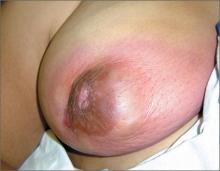The FP diagnosed mastitis with a probable abscess in this patient. Mastitis is seen in up to 3% of lactating women. Mastitis is most commonly caused by Staphylococcus aureus, Streptococcus species, and Escherichia coli. Recurrent mastitis can result from poor selection or incomplete use of antibiotic therapy, or failure to resolve underlying lactation management problems. Mastitis recurring in the same location—or not responding to appropriate therapy—may indicate the presence of breast cancer.
Breast abscess is an uncommon problem in breastfeeding women, with an incidence of less than 1%. A breast abscess and mastitis unrelated to pregnancy and breastfeeding can occur in older women.
In this case, the FP recommended incision and drainage because of the localized area of fluctuance. After the area was drained, purulence was expressed, and the wound was packed.
The patient was started on cephalexin 500 mg qid for 10 days to treat the surrounding cellulitis. She was seen for follow-up the next day. The patient was feeling better and the wound was repacked. The wound culture grew out S. aureus sensitive to methicillin and cephalosporins and cleared fully in the following weeks.
Photos and text for Photo Rounds Friday courtesy of Richard P. Usatine, MD. This case was adapted from: Mayeaux EJ. Breast abscess and mastitis. In: Usatine R, Smith M, Mayeaux EJ, et al, eds. Color Atlas of Family Medicine. 2nd ed. New York, NY: McGraw-Hill; 2013:546-550.
To learn more about the Color Atlas of Family Medicine, see: http://www.amazon.com/Color-Family-Medicine-Richard-Usatine/dp/0071769641/
You can now get the second edition of the Color Atlas of Family Medicine as an app by clicking on this link: http://usatinemedia.com/


